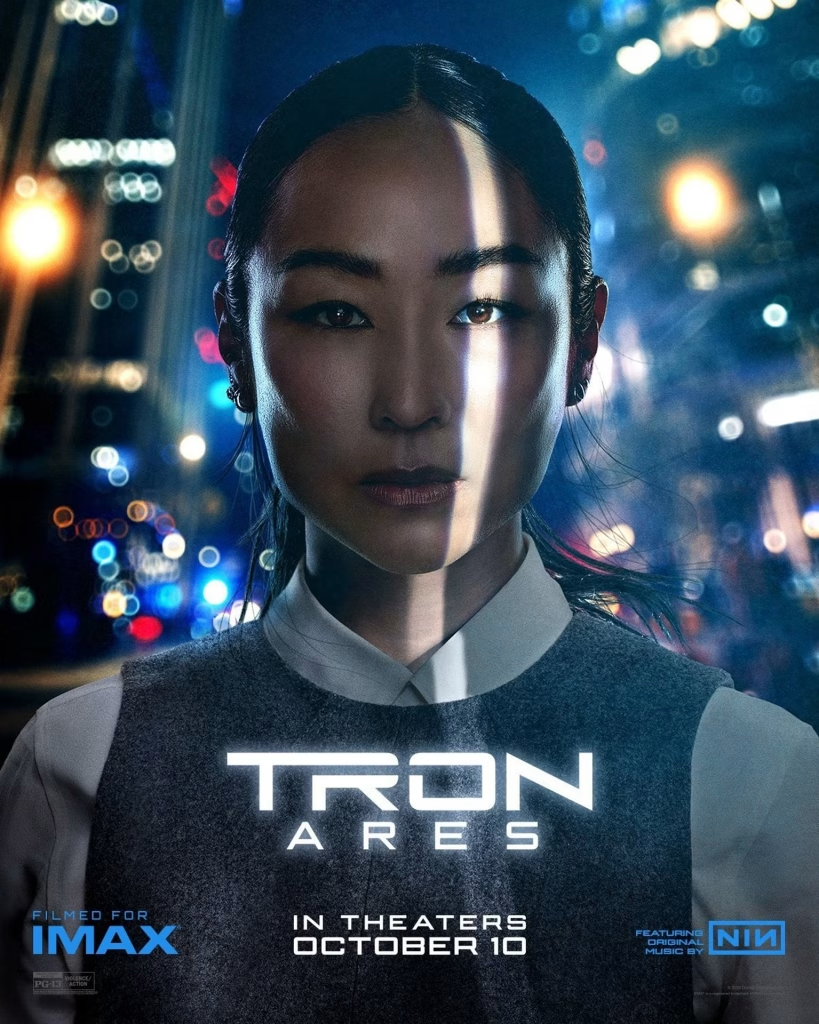From its neon-lit flashes to its grand ideas about identity, Tron: Ares is an immersive revival of the TRON universe that both honors its legacy and teases tantalizing possibilities for its future. Though it takes some bold departures—including the conspicuous absence of Sam Flynn—this latest installment manages to deliver a spectacle that’s as emotionally provocative as visually breathtaking.
To start, it is impossible not to appreciate how Ares leans hard into the visual DNA of the franchise. The Grid’s geometry, its glowing vehicles, the sense that digital constructs can bleed into reality—these are all here, and when they are, the film truly soars.

Director Joachim Rønning gives us sequences that are stunning in their symmetry and ambition—whether it’s light trails snaking through the sky, machines materializing from thin air, or the mournful glow of derezzing programs struggling to last past their 29-minute lifespan.

The cinematography and production design fuse into something that feels part art installation, part sci-fi opera. And the score—thanks to Nine Inch Nails’s Reznor & Ross—is nothing short of masterful, providing both mood and menace in equal measure.

One of the boldest creative choices here is the decision not to bring back Sam Flynn as a central figure. Fans of Tron: Legacy may feel a twinge of longing at this absence. There is a prologue that acknowledges developments since Legacy, but Sam is sidestepped, set up only in passing.

This absence leaves space—and it’s a generous space—for new characters like Eve Kim (Greta Lee) and Julian Dillinger (Evan Peters) to define the stakes. More than that, it gives the film a bridge: a clean slate to rework or expand the mythos without being overburdened by legacy characters.

It’s a risk, but one that mostly pays off—though many viewers will no doubt want to see what happened off-screen with Sam, Quorra, and how Olivia Wilde’s Quorra might be brought in if this becomes a larger franchise again. Tron: Ares appears to lay groundwork for just such a future continuation—one in which Quorra’s courage and naiveté might find a new voice.
One of the more delightful surprises is how Ares treats music—not just as background, but as character. There is a passing but meaningful homage to Depeche Mode’s “Just Can’t Get Enough”, which seems to act as a marker: something old, familiar, joyful, even rebellious, in contrast with the cold precision of artificial constructs.

It’s a reminder that human culture, our quirks and nostalgic touchstones, can’t just be digitized away without loss. That moment works. It tethers the emotional life of the film—however abstract—to something many in the audience will recognize and care about deeply.
Where Tron: Ares truly shines is in its set pieces: the showdowns, the light cycles, the visceral thunder of digital warriors crossing into the flesh-world. These moments are cinematic in the best sense—they make you lean forward, catch your breath, marvel.

Where it stumbles, occasionally, is in the character arcs—Ares himself, for all his wonder at raindrops and neon shadows, is not always as deeply drawn in every scene as one might wish. Greta Lee’s Eve provides much of the emotional anchor; her hope, her grief over her sister, her tug between idealism and realism—she gives this film its beating heart.

If there is a flaw, it is that Tron: Ares sometimes trades storytelling depth for visual spectacle. Some scenes feel heavy on exposition, or introduce ideas (the Permanence Code, the rivalries, the dangers of materialized digital beings) without fully exploring their consequences.
Still, even those missteps feel like the price of ambition. And there is a richness of ideas here—ethical questions about AI, the cost of bringing digital life into reality, the permanence (or impermanence) of creation—that linger after the credits.
Tron: Ares is a triumphant reboot-sequel hybrid: a film that doesn’t simply rest on nostalgia, nor does it reject its past. It reanimates the TRON world for the present day—bold, electric, occasionally messy, yet essential for fans of the genre.
And though Sam Flynn is not present, and Quorra is hinted at only obliquely, Ares unmistakably sets the stage for their return—or for Olivia Wilde’s Quorra to re-enter the fold in some future chapter. That possibility alone gives this film an extra pulse: a promise that the story, like the light in the circuits, is far from over.
★★★★☆

